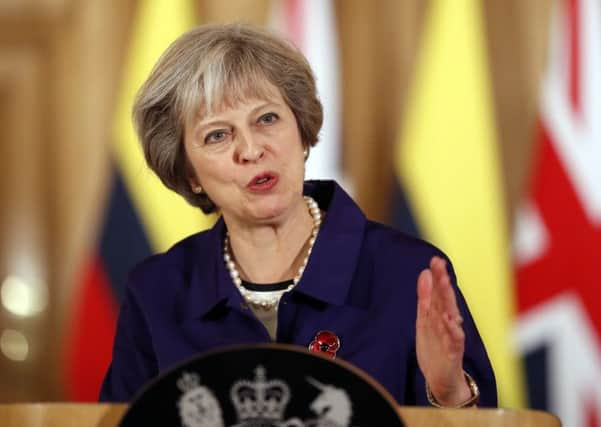Government '˜preparing draft bill to launch Brexit' ahead of appeal


A No 10 spokesman said the “logical conclusion” from last week’s High Court ruling was that the Government would need an Act of Parliament to trigger Article 50 of the European treaties.
But he refused to be drawn on claims that a draft Bill is already being prepared, insisting the Government was focused on appealing against the judgment to the Supreme Court.
Advertisement
Hide AdAdvertisement
Hide AdBrexit Secretary David Davis, who will make a statement to the Commons on Monday, conceded last week that the Government would need an Act of Parliament if it loses its appeal.
That route would give MPs and peers opportunities to table amendments to make the Prime Minister reveal more about her negotiating strategy, or spell out priorities for the talks.
Mrs May has given short shrift to suggestions that MPs might tie her hands by tabling amendments which would require her to make continued single market membership a focus of withdrawal negotiations.
Asked about reports that work had already begun on a draft Bill, the No 10 spokesman told a Westminster briefing: “I’m not going to comment on or be drawn into commenting on the ins and outs of Government and the work that’s going on in Government.
“What I have been clear about, what the Government’s been clear about, is that the focus of the work is on this Supreme Court hearing that’s on December 7 and 8.
“We set out what we believe is a very strong legal position and we’re confident that we will still be able to meet the timetable as has been set out.”
On the High Court ruling, he added: “The judgment isn’t absolutely explicit but there’s a logical conclusion that you would draw from Thursday’s judgment that it would require an Act of Parliament.”
The spokesman also described claims that the Government was looking at drawing up an alternative fast-track resolution, which MPs would not be able to amend, as “speculation”.
Advertisement
Hide AdAdvertisement
Hide AdIt comes after Work and Pensions Secretary Damian Green refused to rule out the alternative approach, claiming it was “impossible” to say how the Government would proceed if it loses in the Supreme Court
Mr Green told the BBC Radio 4 Today programme: “The parliamentary process hasn’t yet been decided.
“It is impossible to say what would happen afterwards in terms of the parliamentary process until we get the Supreme Court (ruling).”
Mr Green stressed it would be “foolish” for the Government to give away in advance its negotiating strategy on issues such as future access to the single market.
But Labour has made clear it will seek to force the Government to lay out its plan.
Mr Green said: “All these choices are being framed in binary ways. The more everyone looks at the detail of this, there are various ways you can approach the single market. There are huge complications here.”
Meanwhile, barristers have warned that Mrs May and Lord Chancellor Liz Truss risked showing “tacit approval” for attacks on the High Court judges following last week’s ruling.
Amid a furious row over media commentary on the judges’ decision, Mrs May highlighted the value of an independent judiciary but added “I also value the freedom of our press” while on her visit to India.
Advertisement
Hide AdAdvertisement
Hide AdOn Saturday, Ms Truss said the independence of the judiciary is the “foundation upon which our rule of law is built” following widespread pressure to condemn the coverage.
Francis FitzGibbon QC, chairman of the Criminal Bar Association (CBA), which has nearly 4,000 members, said: “Neither the Lord Chancellor nor the Prime Minister have done what they ought to do, and unreservedly condemn both the calling of judges ‘enemies of the people’, the demands for their dismissal, and the making of their blameless personal lives into objects of reproach.
“Standing by and saying nothing may not be meant as such, but is likely to be seen as tacit approval for what has gone on, and encouragement for more of the same.
“In these disturbed times, dignified silence doesn’t work because there are too many people who will see it as a green light.”
